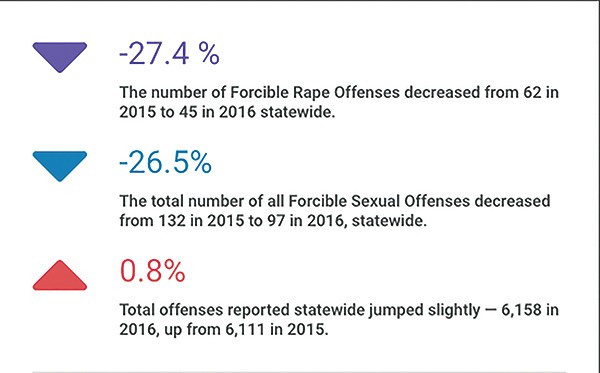Though campus crime as a whole saw a slight uptick in 2016, less than one percent, one area of campus crime has seen a considerable decrease.
For the first time since 2012, cases of sexual assaults reported on college campuses have decreased, according to the latest numbers released by the Tennessee Bureau of Investigation (TBI).

In 2016, there were 45 reported forcible rapes on campuses statewide. That number is down from 62 in 2015, a 27.4 percent decline. The total category for forcible sex offenses, which includes forcible rape, forcible sodomy, sexual assault with an object, and forcible fondling, decreased by 26.5 percent.
While numbers have decreased statewide, two colleges in Memphis — Rhodes College and the University of Memphis — still feel there is work to be done, not only in the way assaults are reported, but also in creating a culture of consent on college campuses.
Both universities had the same number of reported sexual offenses last year — 13. Assaults at U of M occurred both on and off campus, while all sexual assaults occurred exclusively on campus at Rhodes.
Although the U of M has about 18,000 more students than Rhodes, it’s important to note that Rhodes is almost exclusively a residential college, whereas only 10 percent of U of M’s students live on campus.
Because of differentiating factors like residential versus commuter colleges, officials with TBI urge citizens not to compare institutions directly to one another.
“We want citizens to keep in mind that the factors impacting crime typically vary from community to community,” said Leslie Earhart, a public information officer with TBI.
Some of those factors to consider: the accessibility of reporting sexual assault and the surrounding environment that encourages it.
Both universities have options for anonymous reporting, and both universities have awareness campaigns planned for the month of April, which is Sexual Assault Awareness Month.
Bruce Harber, U of M’s Chief Operations Officer, said the school will continue to push for education around consent — the idea that when someone says “no” to any type of sexual advance, it literally means you do not touch the person.
Lynn Conlee, interim communications director for Rhodes, said that the school is seeking to become “a national leader among residential, liberal art colleges in our ongoing approach to student safety.”
Conlee said the college has taken several proactive measures recently, including hiring a full-time Title IX coordinator who will handle all cases of sexual assault and gender discrimination.
Student websites at Rhodes feature a button on each page that allows the student instant and anonymous reporting of any assault, whether they are victim or a witness.